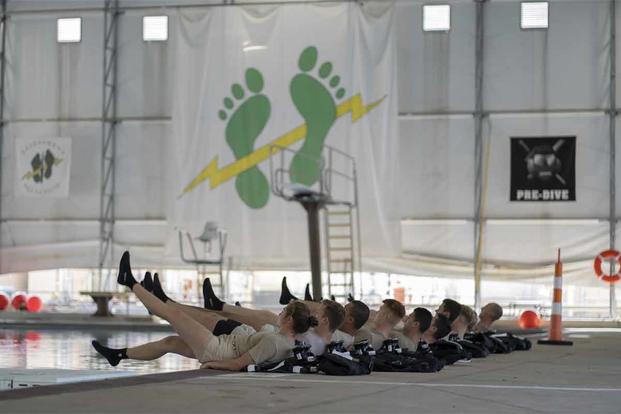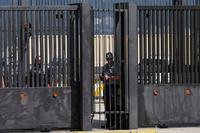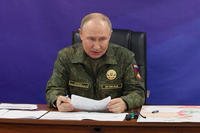A new $66 million aquatic training center being constructed for Air Force Special Warfare candidates will include mixed-sex restrooms, locker rooms and showers as the service tries to further integrate its facilities.
The 76,000 square-foot facility will have two swimming pools as well as private showers and bathrooms that will accommodate both men and women. Officials for the Special Warfare Training Wing, also called SWTW, at Joint Base San Antonio-Lackland said those plans are just a small part of the larger efforts to provide equal spaces for trainees going through the most rigorous courses the Air Force has to offer.
"The mixed-sex facilities built at our candidate course, where we first welcome Special Warfare Airmen, are only the beginning for the SWTW," Col. Nathan Colunga, SWTW commander, said Saturday in a press release. "The larger strategy is to build mixed-sex facilities throughout the entirety of the SWTW footprint, across the nation where every trainee, regardless of gender, is afforded the same level of privacy."
Read Next: Some Airmen Will Be Allowed to Swap Base Assignments Again
The facility is scheduled to be completed in August 2023.
In 2016, the year that then-Defense Secretary Ash Carter opened all military careers to women, the Air Force started integrating women into special warfare training and jobs.
Since then, the Special Warfare Training Wing has graduated five female Special Warfare airmen, according to the news release. There are currently two more female trainees going through the SWTW process.
Recruiting and getting eligible candidates to pass Special Warfare training has not been an easy task.
Maj. Gen. Michele Edmondson, who oversees training as the commander of the Second Air Force, said in a press release the service needs to be intentional in finding people who can join the elite special warfare ranks.
"We continuously struggle to recruit enough people who have the potential to meet our standards in Air Force Special Warfare," Edmondson said. "We need to negate the unintentional barriers that prevent people from being on the team."
Earlier this month, the Air Force created a new program to help recruit and train college-aged ROTC and Air Force Academy cadets for special warfare jobs, which have been difficult to fill.
"Historically, neither the Air Force Academy nor AFROTC filled all of their commissioning slots for Special Warfare, which down the road impacts mission readiness," Col. John Graver with Air Force Special Warfare said in a Sept. 10 press release.
One of the issues the service has faced with selection for special warfare is that many candidates have been physically unprepared to face the strenuous graded events that determine whether they can join the highly selected field, something the new course is designed to remedy.
The new program, which debuted this summer, comes as the Air Force faces its toughest recruiting environment in decades. Earlier this year, the service began offering hefty bonuses -- up to $50,000 -- for its most challenging and dangerous jobs, such as special warfare operators.
Maj. Gen. Ed Thomas, Air Force Recruiting Service commander, told Military.com in an April interview that getting young men and women to sign on the dotted line has been more difficult, and financial incentives help.
"Special Warfare is our toughest area to recruit," Thomas said. "We are looking for people who are uncommonly physically, mentally and emotionally strong. And we're looking for people who are attracted to the adventure and the challenge of being in our nation's Special Operations Forces."
-- Thomas Novelly can be reached at thomas.novelly@military.com. Follow him on Twitter @TomNovelly.
Related: Air Force Creates Special Warfare Program for Cadets to Help Fill Empty Spots












